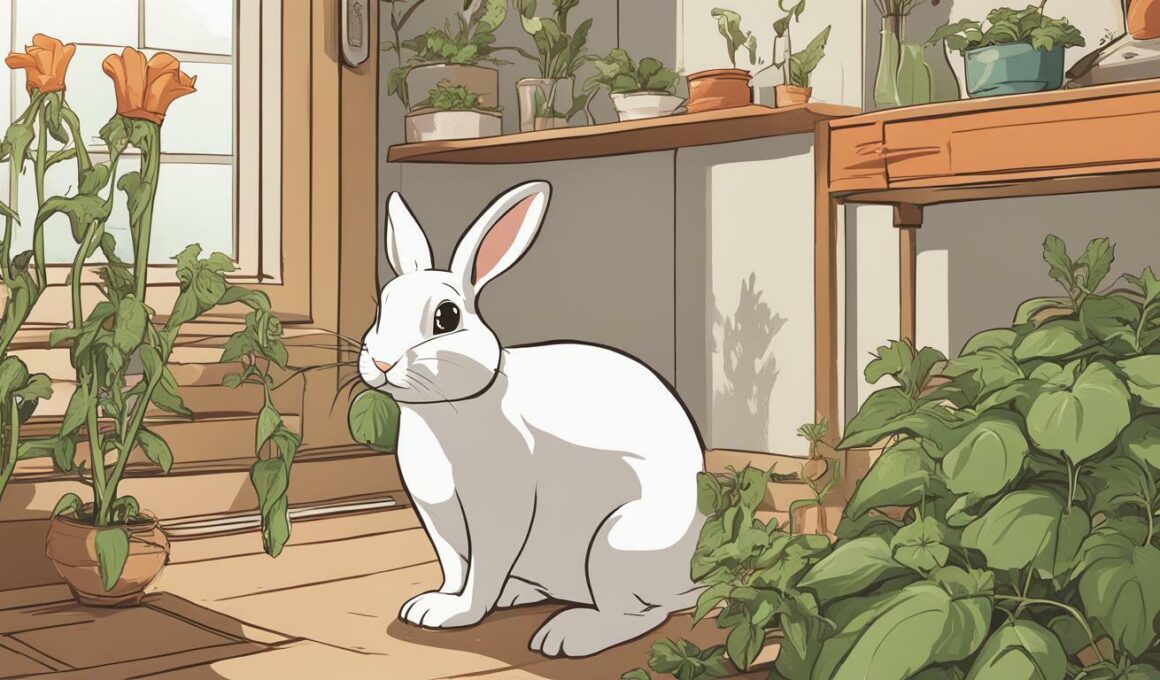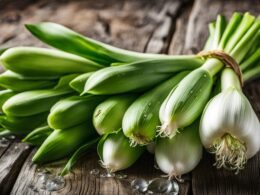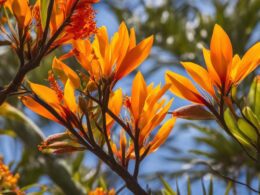If you’re a bunny owner, you’re probably well-versed in the importance of providing your furry friend with a healthy and balanced diet. After all, rabbits need a nutritious diet to maintain their health and well-being. However, you may be wondering if it is safe to feed your rabbit trumpet vine, a beautiful flowering plant that is often found in gardens. In this section, we will explore whether rabbits can safely consume trumpet vine, and provide tips and precautions for bunny owners.
Post Summary:- Rabbits require a balanced and nutritious diet to maintain their health and well-being.
- Trumpet vine may be toxic to rabbits, and it is best to avoid feeding it to them.
- As responsible bunny owners, it is crucial to provide safe plants and vegetables for your furry friend’s diet.
- Proper care practices, such as creating a rabbit-friendly environment and identifying toxic plants, can promote your bunny’s overall health and happiness.
Understanding the Importance of a Rabbit’s Diet
As a bunny owner, you want to make sure your furry friend is healthy and happy. One of the most critical aspects of rabbit care is providing a balanced and nutritious diet. A proper diet can help prevent health issues and promote overall well-being.
A healthy rabbit diet should consist of hay, fresh vegetables, and commercial pellets. These three components provide the necessary nutrients, vitamins, and minerals your bunny needs to thrive.
Hay: Hay should make up the majority of your rabbit’s diet. It is an excellent source of fiber, which promotes digestive health and prevents obesity. The best types of hay for rabbits are timothy, oat, and grass hay. Alfalfa hay is okay for young rabbits, but it should be given in limited quantities to adult rabbits because of its high calcium content.
Fresh Vegetables: Fresh veggies should make up about 10-15% of your rabbit’s diet. Leafy greens like kale, lettuce, and spinach are excellent choices. Vegetables like carrots, broccoli, and bell peppers are also good options. However, avoid feeding your bunny starchy or high-sugar vegetables like potatoes or corn.
Commercial Pellets: Commercial pellets should make up about 5% of your rabbit’s diet. Make sure to choose pellets that are high in fiber and low in protein and carbohydrates. Avoid pellets that contain seeds, nuts, or dried fruit, as they can cause obesity and digestive problems.
It’s essential to understand that a rabbit’s diet needs to be balanced. Too much of any one food can cause health problems. For example, an excess of pellets can cause obesity, while too many sugary vegetables can cause digestive problems.
By providing your bunny with a balanced diet of hay, fresh vegetables, and commercial pellets, you can help ensure they live a happy and healthy life.
Safe Plants for Rabbits: What to Include in Their Diet
As a bunny owner, it’s essential to provide your furry friend with a balanced, nutritious diet that includes a variety of safe plants. Rabbit nutrition plays a significant role in maintaining your rabbit’s health and well-being. Here are some safe plants to add to your bunny’s diet:
| Plant | Benefits |
|---|---|
| Romaine Lettuce | High in fiber, Vitamin A, and potassium. Good for digestion and vision. |
| Carrots (with tops) | Great source of vitamins and minerals, including Vitamin A, beta-carotene, and fiber. Good for teeth and vision. |
| Parsley | Rich in Vitamin C, iron, and fiber. Good for digestion and circulation. |
| Cilantro | Good source of Vitamin C, calcium, and antioxidants. Helps with digestion and reduces inflammation. |
| Basil | Contains antioxidants and has anti-inflammatory properties. Helps with digestion and has a calming effect. |
When introducing new plants to your rabbit’s diet, start with small amounts and monitor your bunny’s reaction to ensure proper digestion. Avoid giving your rabbit plants that may be toxic, including avocado, rhubarb, and tomato leaves.
- Offer your rabbit a variety of plants to prevent boredom and provide essential nutrients.
- Wash all plants thoroughly and remove any stems or leaves that may be harmful.
- Provide fresh, clean water at all times.
- Remember that hay is an essential part of your rabbit’s diet and should make up the majority of their food intake.
By incorporating safe plants into your rabbit’s diet, you can improve their overall health and happiness. Make sure to prioritize their diet and provide a variety of foods to keep your bunny healthy and satisfied.
Trumpet Vine and Its Potential Toxicity for Rabbits
While trumpet vine may add beauty to your garden, it can be toxic to rabbits.
The sap, leaves, flowers, and seeds of the trumpet vine contain lycoricidin, a toxin that can cause gastrointestinal distress, vomiting, and diarrhea in rabbits. In severe cases, it can even lead to liver damage and death.
It’s essential to be cautious when planting trumpet vine in your yard, especially if your furry friend has free access to your garden. Rabbits are curious animals, and they can easily nibble on plants that aren’t safe for consumption.
If you suspect your bunny has ingested any part of the trumpet vine, seek veterinary assistance immediately. Prompt treatment is crucial to minimize the potential health implications.
Are Trumpet Vines Safe for Japanese Beetles to Eat?
Japanese beetles and trumpet vine: While Japanese beetles feed on a variety of plants, trumpet vines are not their preferred choice. Although they may occasionally nibble on the leaves, these beetles tend to avoid trumpet vines due to their unappetizing taste and texture. Hence, it can be said that trumpet vines are generally safe from Japanese beetle infestations.
Precautions and Tips for Bunny Owners
As a responsible bunny owner, it is crucial to take precautions to keep your furry friend safe and healthy. Here are some essential tips to help you care for your rabbit:
Create a Rabbit-Friendly Environment
Ensure your rabbit has a clean and spacious living area with plenty of room to run and play. Provide them with plenty of fresh water and a comfortable place to rest. Keep their living area clean by regularly removing soiled bedding and waste.
Identify and Avoid Toxic Plants
Before adding any new plants to your rabbit’s diet, make sure they are safe to eat. Refer to a comprehensive list of safe plants for rabbits and avoid any toxic plants that could pose a risk to your pet’s health. Know the signs of poisoning and seek veterinary help immediately if you suspect your rabbit has ingested a toxic plant.
Implement Proper Care Practices
Regularly groom your rabbit by brushing their fur to prevent matting. Trim their nails to a proper length and monitor their teeth to ensure they are healthy. Provide them with opportunities to exercise and play, and give them plenty of love and attention.
By following these precautions and care practices, you can keep your bunny happy, healthy, and safe from potential harm.
Conclusion
In conclusion, as a responsible bunny owner, it is essential to prioritize the health and well-being of your furry friend. While trumpet vine may be an attractive plant to have in your garden, it is best to avoid feeding it to rabbits due to its potential toxicity. Instead, focus on providing a balanced diet rich in safe plants and vegetables, and always consult with a veterinarian if you have any questions or concerns about your rabbit’s health.
Remember: Safety First
By being aware of the plants that can pose potential risks to your bunny’s health and implementing proper care practices, you can ensure that your furry friend lives a healthy and happy life. Always make sure to create a rabbit-friendly environment, identify and avoid toxic plants, and practice good hygiene and grooming habits. Your bunny will thank you for it!
Is Trumpet Vine Safe for Rabbits to Eat?
Yes, pink trumpet vine is safe for rabbits to eat. However, it’s important to note that the leaves and flowers of the pink trumpet vine contain a toxic sap, so it’s best to limit their consumption. Additionally, the vine attracts hummingbirds with its bright, trumpet-shaped flowers.
FAQ
Q: Can rabbits safely consume trumpet vine?
A: No, it is best to avoid feeding trumpet vine to rabbits due to its potential toxicity.
Q: What constitutes a healthy rabbit diet?
A: A healthy rabbit diet includes hay, fresh vegetables, and commercial pellets that provide the necessary nutrients for their health and well-being.
Q: What are some safe plants for rabbits?
A: Safe plants for rabbits include leafy greens, herbs, and vegetables that can be included in their diet to provide variety and nutrition.
Q: Is trumpet vine toxic to rabbits?
A: Yes, certain parts of the trumpet vine can be toxic to rabbits and may pose health risks if consumed.
Q: What precautions should bunny owners take?
A: Bunny owners should create a rabbit-friendly environment, avoid toxic plants, and implement proper care practices to ensure the well-being of their rabbits.








